Don't Answer the Phone! Blu-ray Movie
HomeDon't Answer the Phone! Blu-ray Movie 
Blu-ray + DVDVinegar Syndrome | 1980 | 95 min | Rated R | Jan 31, 2017
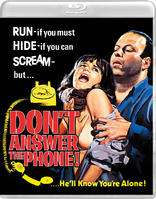
Movie rating
6.1 | / 10 |
Blu-ray rating
| Users | 0.0 | |
| Reviewer | 4.5 | |
| Overall | 4.5 |
Overview
Don't Answer the Phone! (1980)
A deeply disturbed photographer and Vietnam veteran, named Kirk Smith, terrorizes Los Angeles by going around strangling lingerie-clad young women in their homes while taunting Lindsay Gale, a young psychologist, by calling her on a radio call-in show to describe his sexual hang-ups and misogynistic ways, while a local police detective, Lt. McCable, is always two steps behind in trying to catch the psycho.
Starring: Nicholas Worth, Pamela Jean Bryant, Flo Lawrence, James Westmoreland, Chuck Mitchell (I)Director: Robert Hammer
| Horror | Uncertain |
| Mystery | Uncertain |
| Thriller | Uncertain |
Specifications
Video
Video codec: MPEG-4 AVC
Video resolution: 1080p
Aspect ratio: 1.85:1
Original aspect ratio: 1.85:1
Audio
English: DTS-HD Master Audio Mono (48kHz, 24-bit)
Music: Dolby Digital Mono
Also contains commentary
Subtitles
English SDH
Discs
Blu-ray Disc
Two-disc set (1 BD, 1 DVD)
DVD copy
Playback
Region free
Review
Rating summary
| Movie | 2.5 | |
| Video | 5.0 | |
| Audio | 3.5 | |
| Extras | 4.0 | |
| Overall | 4.5 |
Don't Answer the Phone! Blu-ray Movie Review
Reviewed by Brian Orndorf February 4, 2017Many questions arise after a viewing of 1980’s “Don’t Answer the Phone,” including the very meaning of the title. Phones are answered during the course of the picture, but there doesn’t seem to be any malicious intent attached to the act. In fact, phone answering is almost campy, with the film’s introduction detailing a conversation between nurse in her apartment settling in for the night and her mother, who’s clearly being voiced by a man. Perhaps a better title for the production would be “Don’t Aspire To Be a Model” or “L.A. Looked Fun in the 1970s.” Despite a nonsensical title, “Don’t Answer the Phone” has a pretty clear idea of what it wants to be, going full steam ahead as a sexploitation event that’s very comfortable separating actresses from their clothing, while violence is favored over actual screenwriting. Director Robert Hammer keeps the basics of cops and criminals here, using formula to support more particular interests in sleazy murder sequences and a heaping helping of psychological disease. It’s not a particularly pleasant endeavor, but there are select moments where the effort becomes so unhinged, it achieves a level of absurdity that makes it hard to resist.
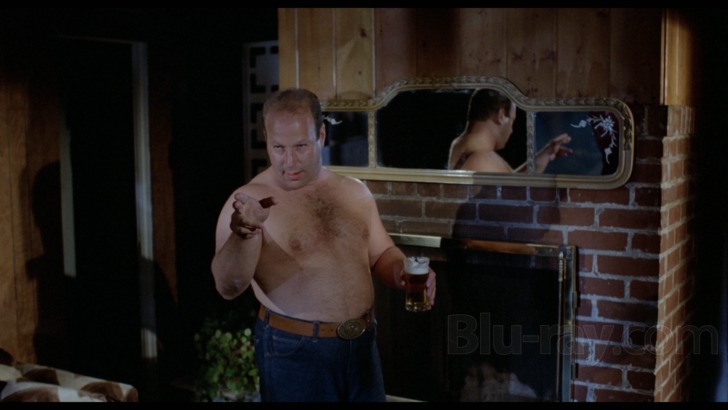
Stalking Los Angeles is Kirk (Nicolas Worth), a Vietnam Vet who’s gradually lost contact with reality, posing as a fashion photographer to meet young women, promptly killing them after he talks them out of their clothes. Kirk is also fond of dominating innocents, using Vietcong ritual murder practices to feed his religious-based mania. Taking lives all around the city, Kirk’s trail of dead befuddles the local cops, with Lt. McCabe (James Westmoreland) and Sgt. Hatcher (Ben Frank) attempting to pick up on any clues left behind, enraged by the grisly crime scenes they encounter. Kirk’s latest fixation is Dr. Gale (Flo Lawrence), a sex therapist who hosts a weekly radio show, inspiring the killer to toy with his potential victim. Making a living selling pornographic pictures to sleaze merchants (play by future “Porky’s” star Chuck Mitchell), Kirk is working himself into a particularly manic state, continuing his reign of terror. Hoping to get close to a professional capable of cracking this psychological code, McCabe pays special attention to Dr. Gale, with the pair embarking on a sexual relationship as Kirk gears up for his most public attack.
When we meet Kirk, he’s embarking on his fifth murder, breaking into the aforementioned nurse’s apartment, creeping on the young woman before raping and strangling her, using a pair of pantyhose with a special coin contained within to complete the job, eventually beginning to devour her before his appetites wane. The scene is familiar to any student of chillers and slashers, watching a shadowy man stalk his angelic prey, playing into B-movie expectations with a display of gratuitous nudity. The difference in “Don’t Answer the Phone” is Kirk’s intensity, meeting a man who lost contact with reality long ago, adrift in a fog of religious devotion and power lifting, building himself into a killing machine with a flair for photography, boasting a portfolio that mixes portraits with porno. He’s a lunatic, barely keeping himself together to meet potential victims, and Worth doesn’t hold back one little bit during his performance, taking Kirk’s poisoned mind to the extreme with acting that mostly highlights snarling, sweating, and quaking as Kirk tortures select women of L.A. before slaughtering them.
Worth is wild in “Don’t Answer the Phone,” becoming a feral animal to best articulate Kirk’s ferocious presence and loss of control. While the acting periodically becomes pure camp, Worth’s broad work is precisely what Hammer needs to keep the movie together. The screenplay (co-written by Hammer and Michael D. Castle) isn’t concerned with creating a story to follow, instead building a battle of frustrations between Kirk, who can’t consume innocence fast enough, and the cops, who can’t find any leads to help stop this oddball serial killer. Time is split between the sides, but instead of tracking glum law enforcement officials, “Don’t Answer the Phone” creates two sarcastic, hot-tempered cops in McCabe and Hatcher, who spend most of the feature trading quips and insults, while their treatment of citizens in genuine need of help borders on abuse. McCabe eventually falls for Dr. Gale in subplot that doesn’t serve any real purpose beyond getting Lawrence out of her dress, but it’s the lone bit of warmth in a screwy effort that tends to celebrate ugly details of Kirk’s massacre instead of using them to frighten viewers. It’s an era-specific approach, but there’s enough violence against whimpering women here to last a lifetime.
For those eager to abandon what “Don’t Answer the Phone” is selling, there’s plenty of background activity to keep the viewing experience interesting. Shot in Los Angeles during the summer of 1979, the picture showcases all kinds of signage and advertising, including billboards for the Bee Gees and Universal Studios Hollywood, and, while out stealing shots to pad Kirk’s evening stalking endeavors, the crew passes by a lengthy line of film fanatics waiting to be let in for the next showtime of “Alien.” Perhaps this isn’t the entertainment envisioned by Hammer, but it does offer a reprieve from his fixation on torturing women.
Don't Answer the Phone! Blu-ray Movie, Video Quality 
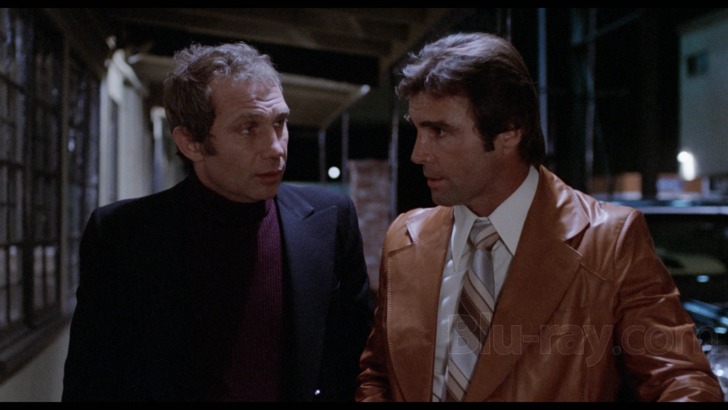
The AVC encoded image (1.85:1 aspect ratio) presentation is billed as "Scanned and restored in 4K from 35mm original camera negative" and it looks terrific, handling cinematographic essentials with care. Detail reaches as far as the original photography goes, picking up on facial particulars and reaction nuances, and costuming delivers fibrous textures. Distances are also welcoming, allowing viewers to inspect the urban drives Kirk takes at night. Colors are tastefully refreshed, preserving period hues and bloodshed, and skintones are natural, with exposed flesh running throughout the feature. Grain is fine and filmic. Delineation is secure, preserving frame information. Source is in good shape, without any pronounced points of damage.
Don't Answer the Phone! Blu-ray Movie, Audio Quality 

The 1.0 DTS-HD MA sound mix isn't consistent. While it's largely ideal with dialogue exchanges, keeping violent extremes and Worth's overacting in check, there are a few passages of damage, introducing muddiness to the listening experience, but these drops in quality aren't permanent. Scoring maintains its synth creep, adding some heaviness to the track with pleasing instrumentation. Atmospherics are limited but effective, and sound effects are direct.
Don't Answer the Phone! Blu-ray Movie, Special Features and Extras 
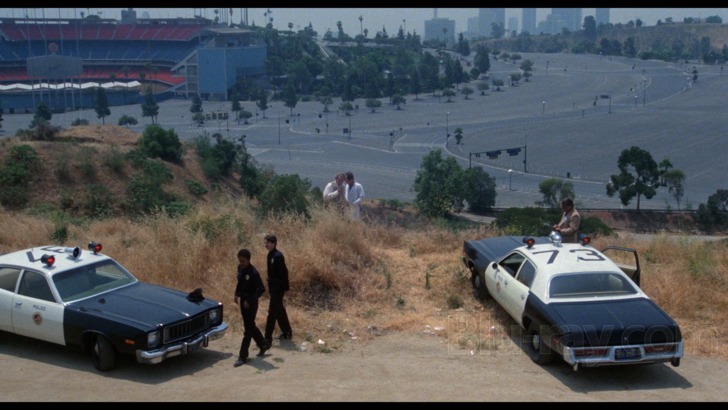
- Booklet (14 pages) contains an essay by Michael Gingold, Blu-ray credits, and a gallery of ad sheets.
- Intro (:26, SD) is a brief greeting from co-writer/director Robert Hammer.
- Commentary features Hammer.
- Isolated Score by Byron Allred is presented.
- "Answering the Phone" (13:41, SD) is a 2006 conversation with Nicolas Worth, who hilariously describes "Don't Answer the Phone" as "hideous." Worth describes his initial interest in performing at the age of eight, his brief military detour in the 1960s, and his return to acting in Los Angeles, showing up in bit parts. Discussing his performance as Kirk the killer, Worth shares his achievements in improvisation, changing the tone of the picture with Hammer's approval, and he shares an anecdote about being recognized inside a theater showing the movie.
- "For What it's Worth" (8:52, SD) is a career overview with Worth, who discusses his time on pictures such as "Swamp Thing," "Hell Comes to Frogtown," and "Darkman."
- Promotional Gallery (1:19) collects marketing materials and negative reviews for "Don't Answer the Phone."
- T.V. Spots (1:00, HD) are offered.
- And a Theatrical Trailer (1:36 HD) is included.
Don't Answer the Phone! Blu-ray Movie, Overall Score and Recommendation 
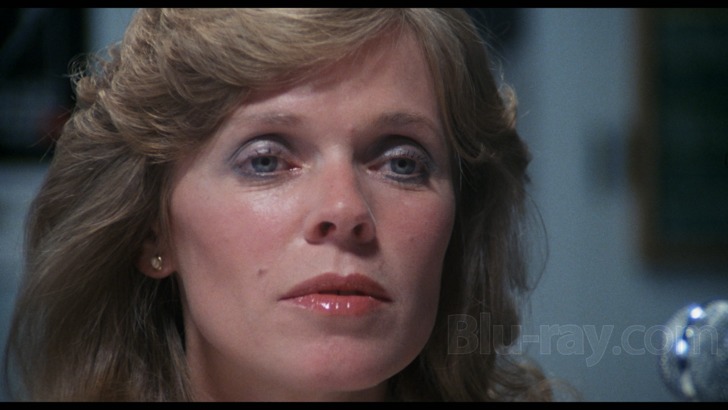
"Don't Answer the Phone" has a few positives to elevate the production. Synth scoring from Byron Allred is compelling, adding an electric groan to suspense efforts, while setting an unnerving mood for Kirk's home life of lifting weights and conversing with himself. The picture is also shot well by cinematographer James L. Carter, who generally avoids grungy extremes to deliver clean, crisp images that showcase interesting lighting and composition, delving deeper into Kirk's fractured state of mind than the writing does. Tech credits are solid, preserving the little appeal that manages to make it all the way through the feature. "Don't Answer the Phone" is unpleasant, and it's intended to be, but something tells me the overall ugliness of the movie wasn't the end game for Hammer, who simply lost control of it all in the hunt to expose as many bare breasts as possible.
Other editions
Don't Answer the Phone!: Other Editions

Don't Answer the Phone!
Slipcover Edition Limited to 3,000
1980

Don't Answer the Phone!
Limited Edition - 1,000 copies
1980
Similar titles
Similar titles you might also like

Double Exposure
Standard Edition
1982

Blood Beat
Standard Edition
1983

Blood Hook
1986

Psychos in Love
1987

Witchboard
1986

Deep Red 4K
Profondo rosso
1975

Blood Harvest
1987

Saw 4K
2004

Hellraiser: Inferno
Hellraiser V
2000

The Retaliators
2021

Child's Play
2019

Jackals
2016

American Mary
2012

Luz
2018

The New York Ripper 4K
Lo squartatore di New York
1982

Night School
Terror Eyes / Warner Archive Collection
1981

Friday the 13th 4K
1980

Tenebrae 4K
Standard Edition
1982

Child's Play 4K
1988

Demon Wind
1990